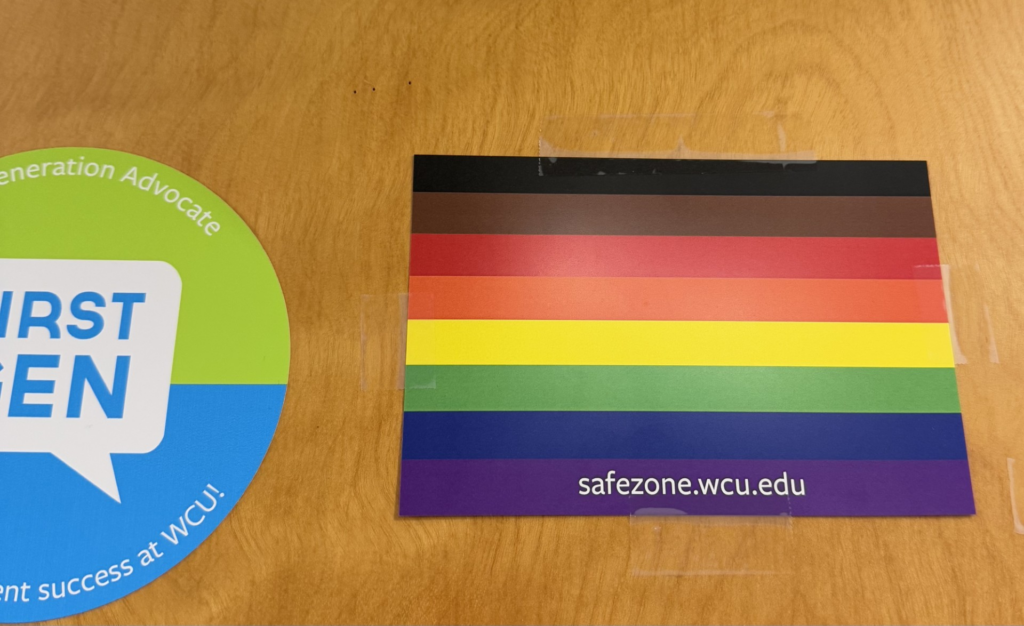While some changes came as no surprise after President Trump took office, others have been put in place more quickly than anticipated.
Executive orders are impacting the LGBTQ community and the queer community at Western Carolina University has something to say about it.
Ash Haight, a creative writing graduate student at WCU shared her thoughts as a transgender woman and the impact of President Trump’s inauguration speech, where he declared the new United States policy “there are only two genders, male and female.”
“I’m gonna be teaching next year. I’m worried for my students that are trans and just queer in general, that I might have. I’m worried for them, that they will be afraid for their lives, that they won’t be able to get the care that they need. I’m just afraid that this is going to drive more trans people to harm themselves because they feel hopeless. I’m refusing to give up hope,” said Haight.

Trans love sticker on WCU campus that has since been removed. Photo by Callia Addikis.
Haight will be teaching English at WCU next year. Haight talks about how the title of one executive order is ‘Protecting Children from Chemical and Surgical Mutilation,’ that is used in place of rhetoric like ‘gender affirming care,’ creating a false narrative.
“The language just shows how much they’re fear mongering and how far they have gone from any understanding of how this actually works,” said Haight.
Haight talks about how transgender people have been around for thousands of years, citing a case in Prague where a 5000-year-old skeleton was found at a burial site for women, suggesting that this person lived as a female.
“We have always existed, and we will always exist,” said Haight. “The president, who has a whole bunch of sexual assault cases and said, ‘grab them by the pussy’ and all that, is now saying he needs to protect woman and cares about protecting women?”
Kyla Parks, a construction management major and representative in the queer community at WCU, is upset in light of DEI initiatives being stripped.
“People who are queer, like visibly queer, people who are people of color, people with disabilities, like, all of these things weren’t getting hired because we have an unconscious bias,” said Parks.
Parks also shared her thoughts about President Trump’s response to Rev. Mariann Budde’s homily where she asked Trump to ‘have mercy’ on LGBTQ children and undocumented immigrants.
“The way he reacted, I feel, is really telling,” said Parks. “And he still reacted because he knows that what he’s doing isn’t like morally right.”
Parks is concerned for the new executive orders like “Ending Radical Indoctrination in K-12 Schooling,’ being enforced in schools and their impact it could have on the younger generations.
“These kids’ mental health is gonna suffer so deeply, and I don’t wanna know how long its gonna take before he realizes that,” said Parks, in reference to Trump and his following.
“All of these executive orders I just they make me afraid for younger trans people more than they make me afraid for myself,” said Haight.
Director of Writing, Rhetoric and Critical Studies Program, Dr. Travis Rountree, shares some hope on the subject.
“To celebrate queer job is a radical act of resistance,” said Rountree. He notes that this concept has been shared amongst the queer community, but it is important to keep in mind in a time like this.

Rountree talks about how certifications like Safe Zone are a great way to let students know that they are not alone and that they can get help from faculty. He also talks about the importance of community and shares resources like a queer therapy group at CAPS.
“The name of the game with all of this is like to overwhelm all of us with so much information all at once so that we sort of feel defeated, but I think the more we find one single goal, even if that goal is you know ‘hey we’re gonna host the school event for this group of the community,’ that’s great. Start small and go from there,” said Rountree.



